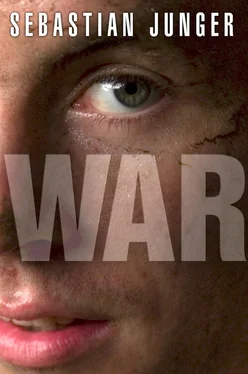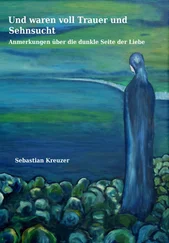THIS BOOK WAS THE RESULT OF FIVE TRIPS TO THE Korengal Valley in eastern Afghanistan that I took between June 2007 and June 2008 for Vanity Fair magazine. I was an “embedded” reporter and entirely dependent on the U.S. military for food, shelter, security, and transportation. That said, I was never asked — directly or indirectly — to alter my reporting in any way or to show the contents of my notebooks or my cameras. I worked with a photojournalist named Tim Hetherington, who also made five trips to the Korengal, sometimes with me and sometimes on his own. Our longest trips lasted a month. Tim and I shot roughly 150 hours of videotape, and that material was aired in brief form on ABC News and then became the basis of a feature-length documentary, produced and directed by Tim and me, called Restrepo .
Many scenes in this book were captured on videotape, and wherever possible I have used that tape to check the accuracy of my reporting. Dialogue or statements that appear in double quotations marks (“. . .”) were recorded directly on camera or in my notebook while the person was speaking, or soon thereafter. Dialogue recalled by someone later is indicated by single quotation marks (‘. . .’). Some scenes that I was not present for were entirely reconstructed from interviews and videotape. Many scenes in this book are personal in nature, and I have shared those sections with the men involved to make sure they are comfortable with what I wrote. I hired an independent fact-checker to help me combat the inevitable errors of journalism, and a bibliography of sources that were consulted appears at the back of the book. In many cases I have shortened quotes from interviews and texts in order to ease the burden on the reader.
By cowardice I do not mean fear. Cowardice… is a label we reserve for something a man does. What passes through his mind is his own affair.
— Lord Moran,
The Anatomy of Courage
Six Months Later
O’Byrne is standing at the corner of Ninth Avenue and 36th Street with a to-go cup in each hand and the hood of his sweatshirt pulled up. It’s six in the morning and very cold. He’s put on twenty pounds since I last saw him and could be a laborer waiting for the gate to open at the construction site across the street. Now that he’s out of the Army I’m supposed to call him Brendan, but I’m finding that almost impossible to do. We shake hands and he gives me one of the coffees and we go to get my car. The gash across his forehead is mostly healed, though I can still see where the stitches were. One of his front teeth is chipped and looks like a fang. He had a rough time when he got back to Italy; in some ways he was in more danger there than in combat .
O’Byrne had been with Battle Company in the Korengal Valley, a small but extraordinarily violent slit in the foothills of the Hindu Kush mountains of eastern Afghanistan. He was just one soldier out of thirty but seemed to have a knack for putting words to the things that no one else really wanted to talk about. I came to think of O’Byrne as a stand-in for the entire platoon, a way to understand a group of men who I don’t think entirely understood themselves. One valley to the north, two platoons from Chosen Company accumulated a casualty rate of around 80 percent during their deployment. Battle Company wasn’t hit that hard, but they were hit hard enough. This morning I’m going to interview Justin Kalenits, one of the wounded from Chosen, and O’Byrne has asked if he could join me. It’s a cold, sunny day with little traffic and a north wind that rocks the car along the open stretches and on the bridges. We barrel southward through the industrial dross of New Jersey and Pennsylvania talking about the deployment and the platoon and how strange it is — in some ways for both of us — to find ourselves in the United States for good. I spent the year visiting O’Byrne’s platoon in the Korengal, but now that’s over and neither of us will ever see it again. We’re both dreaming about it at night, though, weird, illogical combat sequences that don’t always end badly but are soaked in dread .
Kalenits was shot in the pelvis during what has come to be known as the Bella Ambush. Bella was one of the firebases operated by Chosen Company in the Waygal Valley. In early November, fourteen Chosen soldiers, twelve Afghan soldiers, a Marine, and an Afghan interpreter walked to the nearby village of Aranas, met with elders, and then started to walk back. It was a setup. The enemy had built sandbagged positions in a 360-degree circle around a portion of the trail where there was no cover and the only escape was to jump off a cliff. By some miracle, Chosen held them off. Six Americans and eight Afghans were killed and everyone else was wounded. An American patrol hasn’t taken 100 percent casualties in a firefight since Vietnam .
We turn into Walter Reed Army Medical Center and park in front of Abrams Hall, where Kalenits lives. We find him in his room smoking and watching television in the dark. His blinds are down and cigarette smoke swirls in the slats of light that come through. I ask Kalenits when was the first moment he realized he was in an ambush, and he says it was when the helmet was shot off his head. Almost immediately he was hit three times in the chest, twice in the back, and then watched his best friend take a round through the forehead that emptied out the back of his head. Kalenits says that when he saw that he just “went into awe.”
There were so many muzzle flashes around them that the hills looked like they were strung with Christmas lights. The rounds that hit Kalenits were stopped by ballistic plates in his vest, but one finally hit him in the left buttock. It shattered his pelvis and tore up his intestines and exited through his thigh. Kalenits was sure it had severed an artery, and he gave himself three minutes to live. He spotted an enemy machine-gun team moving into position on a nearby hill and shot at them. He saw the men fall. He went through all of his ammunition except for one magazine that he saved for when the enemy came through on foot to finish everyone off .
Kalenits started to fade out from lack of blood and he handed his weapon to another man and sat down. He watched a friend named Albert get shot in the knee, and start sliding down the cliff. Kalenits’s team leader grabbed him and tried to pull him back, but they were taking so much fire that it was going to get them both killed. Albert yelled to his team leader to let go and he did, and Albert slid partway down the cliff, losing his weapon and helmet on the way. He finally came to a stop and then got shot three more times where he lay .
Rocket-propelled grenades were exploding all around them and throwing up so much dust that the weapons were jamming. Men were spitting into the breeches of their guns, trying to clear them. For the next hour Kalenits faded in and out of consciousness and the firefight continued as one endless, deafening blur. It finally got dark and the MEDEVAC bird arrived and started hoisting up the wounded and the dead. There was a dead man in a tree below the trail and dead men at the bottom of the cliff. One body fell out of the Skedco harness as it was being hoisted into the helicopter, and a quick-reaction force that had flown in from Battle Company had to search for him most of the night .
Читать дальше
Конец ознакомительного отрывка
Купить книгу













